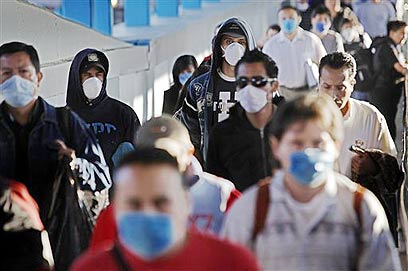
3rd case of swine flu diagnosed in Israel
Thirty-four-year old man confirmed as infected with H1N1 virus after returning from Mexico; said to be doing well. Three additional Israelis suspected of having contracted swine flu hospitalized. World Health Organization says 615 people have been infected by flu in 15 countries
A third case of swine flu was diagnosed in Israel Saturday: Laboratory findings confirmed that a 34-year-old man, hospitalized in the Sourasky Medical Center in Tel Aviv after returning from Mexico, contracted the H1N1 virus.
The man was admitted to Sourasky's isolation ward. His spouse has been admitted to the hospital as well, fearing she too may have been infected. Her test results are pending; both are said to be doing well.
The couple had arrived at Ichilov Medical Center in Tel Aviv on Wednesday, after returning from Mexico. They both complained of a sore throat and runny nose, but were sent home when doctors found they had no fever.
Professor Yehuda Carmeli, who heads the hospital's epidemiological ward, told Ynet that "the husband had a runny nose and a sore throat, and the wife had relatively mild symptoms – but they had no fever, which is one of the disease's defining symptoms, so we sent them home".
However Carmeli says the two were warned to stay home and refrain from entering crowded areas. "We asked them to notify us of any change," he says.
Meanwhile the Hadassah Ein Karem Hospital in Jerusalem and Ichilov in Tel Aviv have admitted three additional patients suspected of having contracted the H1N1 virus. In Jerusalem are a 33-year-old woman and her 8-month-old son, who were on a flight from New York to Tel Aviv along with passengers returning from Mexico.
In Tel Aviv is a 20-year-old woman who recently returned from Mexico and noticed the emergence of flu-like symptoms. The three have all begun preventative treatments
Saturday also saw the World Health Organization raise its tally of confirmed human cases of swine flu to 615 from 365, with 17 confirmed deaths.
The global body said that 15 countries have now reported confirmed H1N1 cases: Mexico – 397 cases and 16 deaths, the United States – 141 cases and one death, Canada – 34 cases, Spain and Britain – 13 each; New Zealand and Germany – four confirmed cases each, Israel – two cases, and Austria, Denmark, France, Hong Kong, the Netherlands, South Korea and Switzerland have reported one case each.
But experts say the swine flu outbreak that has alarmed the world appears less ominous, with the virus showing little staying power in the hardest-hit cities and scientists suggesting it lacks the genetic fortitude of past killer bugs.
A flu expert said Saturday that he sees no reason to believe the virus is particularly lethal. And a federal scientist said the germ's genetic makeup lacks some traits seen in the deadly 1918 flu pandemic strain and the more recent killer bird flu.
Is the worst over?
Still, it is too soon to be certain what the swine flu virus will do. Experts say the only wise course is to prepare for the worst, but in a world that's been rattled by the specter of a global pandemic, glimmers of hope were more than welcome Friday.
"It may turn out that H1N1 runs its course like ordinary flues, in which case we will have prepared and we won't need all these preparations," US President Barack Obama said Friday.
In Mexico, where swine flu has killed at least 16 people and the confirmed case count has surpassed 300, the health secretary said few of the relatives of 86 suspected swine flu patients had caught the virus. Only four of the 219 relatives surveyed turned up as probable cases.
As recently as Wednesday, Mexican authorities said there were 168 suspected swine flu deaths in the country and almost 2,500 suspected cases, but Mexican officials now say those totals may have even been inflated.

Pedestrians in Mexico City (Photo: AP)
Mexico shut down all but essential government services and private businesses Friday, the start of a five-day shutdown that includes a holiday weekend. Authorities there will use the break to determine whether emergency measures can be eased.
In the Mexican capital, there were no reports of deaths overnight, for the first time since the emergency was declared a week ago, said Mayor Marcelo Ebrard. "This isn't to say we are lowering our guard or we think we no longer have problems," Ebrard said, "But we're moving in the right direction."
There were still plenty of signs Friday of worldwide concern, but in Mexico, officials have voiced optimism for two days that the worst may be over.
A top Mexican medical officer questioned the World Health Organization's handling of the early signs of the swine flu scare, suggesting that a regional arm of the WHO had taken too long to notify WHO headquarters of about a unusually late rash of flu cases in Mexico.
The regional agency, however, provided a timeline to the AP suggesting it was Mexico that failed to respond to its request to alert other nations to the first hints of the outbreak.
The Mexican official, chief epidemiologist Dr. Miguel Angel Lezana, backtracked Friday, telling Radio Formula: "There was no delay by the Mexican authorities, nor was there any by the World Health Organization."
The Associated Press contributed to this report










